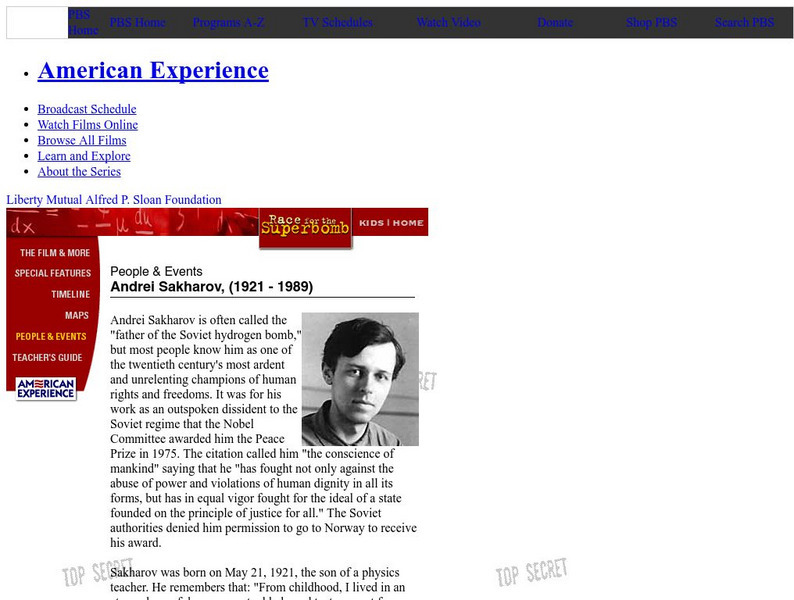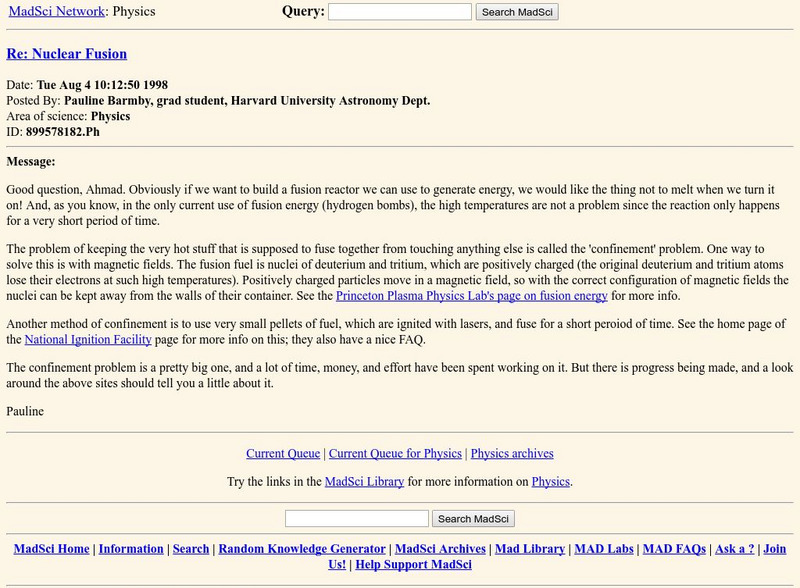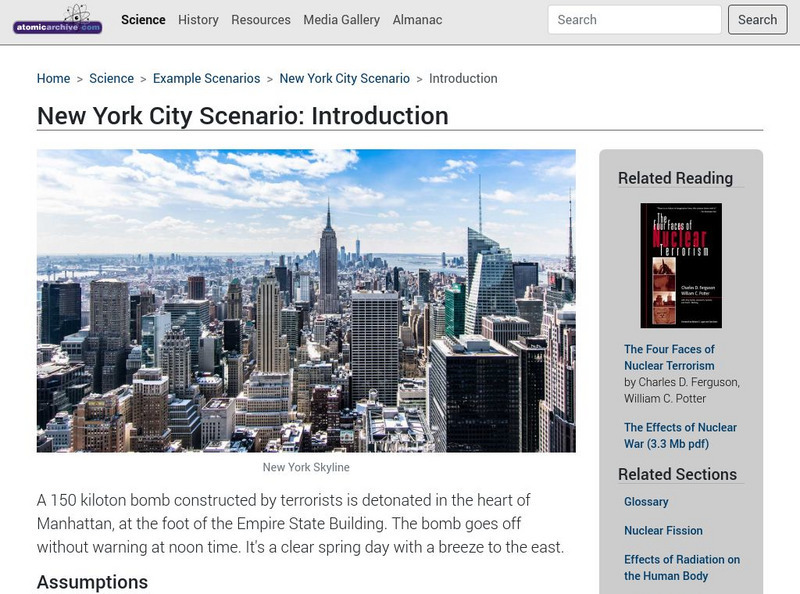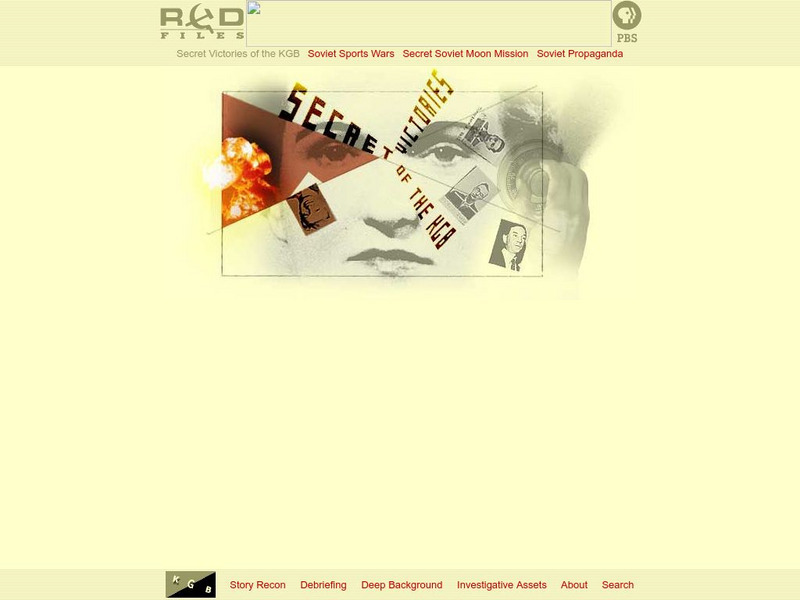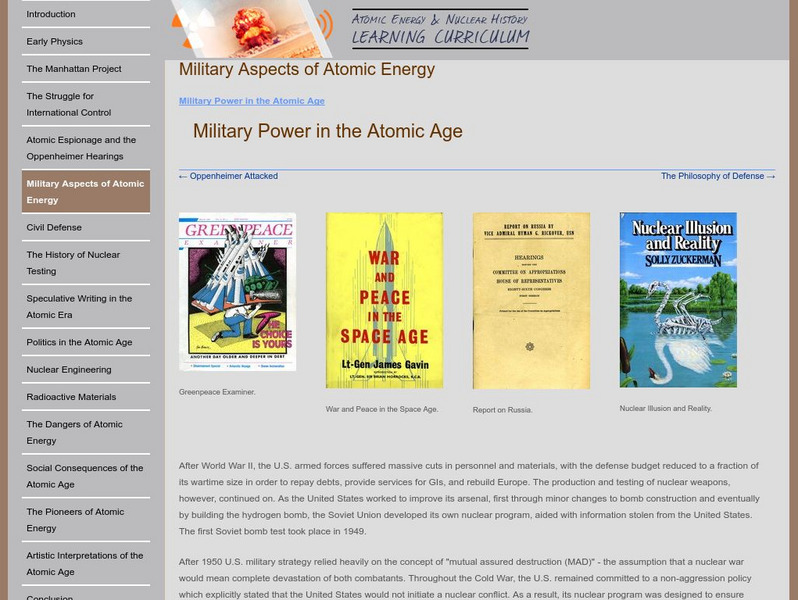Famous Scientists
Famous Scientists: Edward Teller
Learn about Edward Teller, knows as the father of the hydrogen bomb, and the scientist who made numerous contributions to nuclear and molecular physics, spectroscopy and surface physics
PBS
Pbs: Atomic Bomb
Extensive treatment of PBS movie "Race for the Superbomb". Includes timeline, maps, special features, and teacher's guide. Extensive links to people and events.
A&E Television
History.com: Why the Air Force Almost Blasted the Moon With an H Bomb
Detonating a thermonuclear weapon on the moon? It sounds like the bizarre scheme of a deranged comic-book villain -- not a project initiated inside the U.S. government. But in 1958, as the Cold War space race was heating up, the U.S. Air...
PBS
Pbs: American Experience: Race for the Superbomb: Andrei Sakharov
Provides brief biography on Andrei Sakharov, who is called "father of the Soviet hydrogen bomb", but most people know him as one of the twentieth century's most ardent and unrelenting champions of human rights and freedoms.
Curated OER
The First H Bomb Explodes at Enewatek Atoll on 1 November 1952
This site explains the awesome power and destructive force associated with exploding a hydrogen bomb. Site is brief but informative. A great introduction to learning about the hydrogen bomb.
MadSci Network
The Mad Scientist Network: About Nuclear Fusion
Using a question and answer format, this page introduces and explains the idea of nuclear fusion. The hydrogen bomb and its operation is discussed. Other applications of nuclear fusion are described. Short but clear.
MadSci Network
The Mad Scientist Network: About Nuclear Fusion
Using a question and answer format, this page introduces and explains the idea of nuclear fusion. The hydrogen bomb and its operation is discussed. Other applications of nuclear fusion are described. Short but clear.
PBS
Pbs Learning Media: Nuclear Blast Damage
This illustrated document from the AMERICAN EXPERIENCE Web site examines the "zones of destruction" caused by nuclear weapons.
Atomic Archive
Atomic Archive: Example Scenario: New York Example
From the Atomic Archive - the online companion to the award-winning CD-ROM. This page (and the several that follow from it) paint a picture of the events which would occur if an H-bomb was dropped pon New York City. The effect of the...
Wikimedia
Wikipedia: J. Robert Oppenheimer
This biography from the encyclopedia Wikipedia of physicist Robert Oppenheimer discusses his education, his creation of the atomic bomb, and later, his opposition to the use of the bomb.
PBS
Pbs Teachers: Secret Victories of the Kgb
Explore the role of espionage in wartime and investigate Soviet spy activities during the Cold War. Trace the history of the atomic bomb and explore Soviet activities in stealing nuclear secrets during the Manhattan Project.
Other
Nuclear files.org: Julius Robert Oppenheimer
At this site from Nuclearfiles.org you can read a biography of J. Robert Oppenheimer and about his career as a scientist and his important involvement with the Manhattan Project and Atomic Energy Commission.
Flow of History
Flow of History: Nuclear Arms Race
The events and countries involved in the nuclear arms race are profiled. Text plus a colored graphic flowchart make the topic visually appealing and of interest to both students and educators.
Oregon State University
Oregon State University: Military Aspects of Atomic Energy: Military Power
Article describes military power in an atomic age and perception at home and abroad during the 1950s.
Oregon State University
Oregon State University: Atomic Energy and Nuclear History: Civil Defense
Online exhibit from Oregon State University on Atomic Energy and Nuclear History, this section features philosphy of defense.
Atomic Archive
Atomic Archive: Nuclear Test Sites
From the Atomic Archive - the online companion to the award-winning CD-ROM. This page includes an interactive Shockwave movie which allows visitors to explore the prevalence of global test sites for nuclear weapons from the mid 1940s to...
Khan Academy
Khan Academy: Atomic Fears and the Arms Race
Looks at the nuclear arms race in the 1950s as the United States and the USSR both stockpiled nuclear weapons. Includes 1951 propaganda video showing schoolchildren how to 'Duck and Cover' in the event of a nuclear attack. [9:15]
Other
Lcid: Comparison of Fission and Fusion Processes
From the Science Teacher's Resource Center. A data sheet tabulating the many differences between nuclear fission and nuclear fusion. Technical information about the nuclear reactions, the mass defect, isotope masses, etc. is included.
Other
Atom Central: The Cuban Missile Crisis
A timeline of events between October 15 and November 1, 1963 depicts the time period during which the Cuban Missile Crisis took place,


